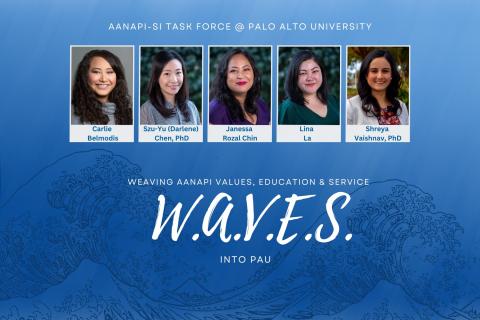
Celebrating Asian Pacific American Heritage Month

As part of Asian Pacific American Heritage Month, we are excited to announce Palo Alto University’s (PAU) newly formed Asian American and Native American Pacific Islander (AANAPI) Task Force. The mission of the group is to promote cultural inclusivity, equity, and visibility of PAU AANAPI community members through advocacy, connection, research, clinical training, and professional development.
This task force was created in response to PAU being designated as an Asian American, Native American, Hawaiian, Pacific Islander (AANAHPI) serving institution. “I learned about this designation and wondered why there wasn’t a task force leading the charge to take advantage of the opportunities affiliated with it, so I decided to create one,” said Szu-Yu (Darlene) Chen, PhD, professor, and associate chair for the MA in Counseling program, originally from Taiwan.
To fund the creation of this task force, Dr. Chen successfully applied for the Operational Excellence Strategic Initiative Grant and created a team of five in the fall of 2022, including faculty member Shreya Vaishnav, PhD, and staff members Carlie Belmodis, Lina La, and Janessa Rozal Chin.
“We received the Operational Excellence grant to ensure that DEIB [diversity, equity, inclusion, and belonging] principles are integrated at the operational level at PAU,” said Carlie Belmodis, strategic communications and engagement manager, originally from Hawaii. “At PAU, we say that we value DEIB, but how are we doing this? This group will provide resources and training, and create spaces where AANAPI community members feel that they belong. We are not just talking about DEIB, we are taking action and actually doing it.”
For the past six months, these founding members have been meeting monthly to assess the needs of the PAU AANAPI community and identify office, department, and university infrastructures where faculty and staff can improve and develop new resources to meet these needs.
“These needs are important, and we want to be loud and proud,” said Shreya Vaishnav, PhD, assistant professor in the MA in Counseling program, who identifies as an Indian American and migrated from Mumbai, India. “The task force strives to bring more visibility and attention to AANAPI resources and provide opportunities for learning, training, scholarship, and community building among PAU’s AANAPI members.”
Additionally, the group is exploring ways to offer AANAPI students peer mentoring, community networking, leadership/professional development, and academic skills support. To that end, Dr. Chen is developing a curriculum for master’s in counseling students to address the specific needs of Mandarin-speaking individuals seeking mental health. According to a recent study of California-based master’s in counseling programs, this training will be the first of its kind.
“There is a huge need in the Bay Area for Mandarin-speaking mental health professionals, so I’m creating this training, which hopefully will decrease the barriers for Mandarin-speaking clients to getting help,” said Dr. Chen.
Three Key Initiatives:
Along with focusing on the recruitment and retention of AANAPI students, faculty, and staff at PAU, the task force identified these important initiatives to accomplish in the coming year:
- Collaborate with the Asian Pacific American Student Association (APASA) to invite guest speakers with expertise in the AANAPI community.
- Create a thriving affinity group with active engagement of students, staff, and faculty to embed AANAPI values across all programs at PAU.
- Host in-person and hybrid events that celebrate and honor the AANAPI diaspora while building community and increasing the visibility of AANAPI culture to all of PAU.
“I was honored to be welcomed as part of this task force, to start this up with such a lovely group of people, and be able to pioneer something so important,” said Lina La, administrative assistant in the counseling department. “I’m passionate about being a supportive presence for our community, which is so needed right now.”
Given that “community” is the theme of the University this year, the task force will organize casual gatherings (both in-person and virtual) for the AANAPI community to connect and create a foundation of emotional support and belonging.
“We want to create spaces where people can come together and share stories, conversations, and food from our culture. Spaces where we can process our unique struggles and acknowledge obstacles specific to the AANAPI community. Spaces where we can just sit and listen to each other,” said Dr. Chen. “It may sound elementary, but unfortunately, not many AANAPI community members have experienced simply being heard.”
In the coming months, the task force will open its doors to students, faculty, and staff to join the AANAPI group. Assistant Registrar and Staff Council Chair, Janessa Rozal Chin recently coined the group’s name “WAVES”. WAVES is an acronym that stands for “Weaving AANAPI Values, Education, and Service.”
“Since water is so significant to many people in the AANAPI community, we came up with the acronym WAVES, and hopefully, we will make some ‘waves’ and have an impact at PAU,” said Chin. “We’re also discussing how we can support and collaborate with other affinity groups on campus, such as the Latinx Task Force, Diaspora, and Union of International Students so that all students can find support, experience belonging, and find their home at PAU.”
______
If you’re interested in joining or learning more about “WAVES into PAU” please fill out this Google form.
